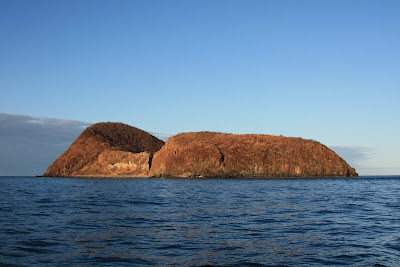Shortly after 3 am, I saw a light glimmering on the ridge. It seemed to grow stronger, and for a moment I wondered if the ridge was on fire, but then the waning crescent of an old moon rose over the mountains. As the slim sickle slid into the sky, its penumbra was clearly visible and it seemed to point towards two glowing planets. It was such a beautiful sight that I reached back and knocked on the hatch over Sten's sleeping head, to wake him so that he could experience it too. As we watched the moon rise, we understood why Arabian cartographers once knew Madagascar as Gezirat Al-Komor, the 'Island of the Moon.'
In the following hour, Dawn's peachy blush began to spread over the tops of the mountains, turning the black sky blue. The sublime sunrise slowly revealed the islands around which we were navigating to be barren, craggy rocks and the sunken craters of ancient volcanoes. Our surroundings this morning couldn't have been more different than the lush, verdant islands that we left behind in the Seychelles. This ability to move between completely different environments is one of the things that we most love about cruising. It almost makes passages worthwhile.
As we approached the mainland, along the coast we could just make out small villages, comprised of squat, thatched roof huts and animal pens. We looked for a place to drop our anchor and recover from an exhausting trip. We eventually found ourselves in a deep turquoise bay, surrounded by five tiny villages and hills the color of well-loved copper pots. Rather than anchoring in front of any one village, we chose to drop anchor in the middle of the bay.
Within an hour, as we were making our first pot of coffee in five days (the passage south had been too rough to stomach anything more acidic than tea), the first dugout canoe arrived at our stern, paddled by two men bearing bananas and mango salad. We haven't yet learned any Malagasy, and our French is really pathetic, so our conversation was very disjointed. In the end we traded a few empty containers for the bananas and gave a young man named Gilbert a pair of old diving fins in return for his promise to return with some mud crabs.
As we began to put our home to order after a wet and destructive passage, we were visited by several more canoes, which seemed to come from each of the villages around the bay. SuperMarche Mata'irea was apparently open for business. We traded fishing hooks and line for papaya salad, baseball hats and magazines for limes, and batteries for a jar of homemade fermented sugar cane syrup, called betsa betsa. When we didn't need the things that were offered (duck eggs, chicken eggs, more bananas and limes) we gave things (shirts, hooks and magazines) away. With no store within miles, and no mechanized means of transport apparent, having us show up with lots of essential bits on board was a bit, I imagine, like Christmas.
By the end of the day, we'd recovered some of our lost French and learned a few words of Malagasy. We had also received a pile of mud crabs, which we st fried with green onions and ginger for a delicious dinner celebrating our arrival in Madagascar. We think we're going to like it here.






No comments:
Post a Comment